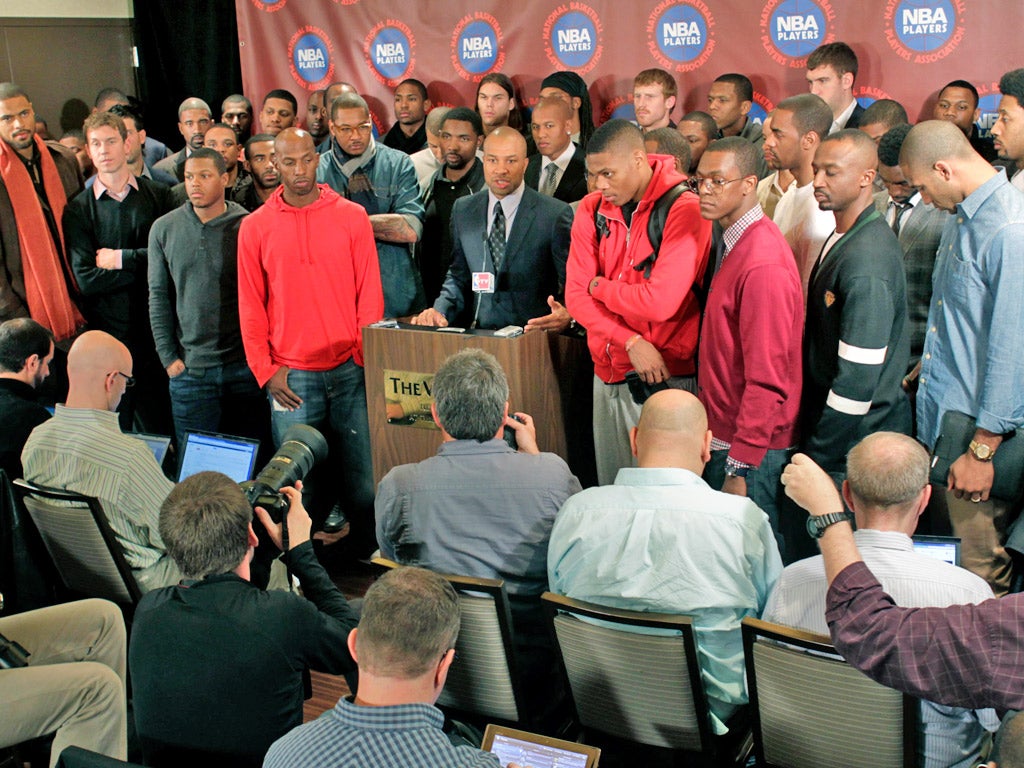Basketball: Deadlock leaves NBA staring into abyss
Money at core of dispute between players and owners which is likely to mean season is cancelled

Your support helps us to tell the story
From reproductive rights to climate change to Big Tech, The Independent is on the ground when the story is developing. Whether it's investigating the financials of Elon Musk's pro-Trump PAC or producing our latest documentary, 'The A Word', which shines a light on the American women fighting for reproductive rights, we know how important it is to parse out the facts from the messaging.
At such a critical moment in US history, we need reporters on the ground. Your donation allows us to keep sending journalists to speak to both sides of the story.
The Independent is trusted by Americans across the entire political spectrum. And unlike many other quality news outlets, we choose not to lock Americans out of our reporting and analysis with paywalls. We believe quality journalism should be available to everyone, paid for by those who can afford it.
Your support makes all the difference.US professional basketball is facing the loss of the entire 2011-12 season that was supposed to have started a fortnight ago, after the NBA players' union rejected the latest labour contract proposal from owners, and dug in for a legal battle that could last for months.
The possibly terminal breakdown came as the lockout imposed by owners entered its 137th day. The union is now taking the formal steps to "decertify", in other words to dissolve itself. This tactic would enable players to launch an antitrust suit against the owners, adding a new layer of rancour to a dispute already bitter enough.
The anger was evident in the reaction of the two sides as the latest talks collapsed on Monday. For the union, "the collective bargaining process has completely broken down". But NBA commissioner David Stern, who represents the owners, accused players of being "hell-bent on self-destruction", and of sending the sport into a "nuclear winter". The move to decertify was simply "a charade", he declared.
The dispute is about many things, including the length of player contracts and proposals to ensure better competitive balance between teams. Inevitably, however, at the bottom of it, is money, and how to divide the NBA's annual $4bn (£2.5bn) of revenues.
Under the previous labour agreement, the players received 57 per cent and the owners 43 per cent. In their final "take it or leave it" offer that the union dismissed on Monday, the latter proposed a 50/50 split. With players refusing to go below 52 per cent, and the owners now threatening a new proposal that would guarantee players only 47 per cent, deadlock is complete.
Before the breakdown, the plan had been for an NBA regular season of 72 games (10 fewer than normal), starting on 15 December. Given that a minimum of 30 days would be needed to prepare for a season, that target is now out of the question. Unless there's a settlement by Christmas, even a shortened season may be beyond salvage.
Owners claim that 22 of the 30 NBA franchises are losing money, but the union challenges those figures, and claims that its members, who are paid only during the playing season proper, are now losing $350m a month in salary. The sheer scale of potential losses may propel the two sides to a deal. If not though, the NBA would be the first of the four major US professional sports leagues to lose an entire season since 2004-05, when the National Hockey League season was wiped out by a similar dispute. Before that, in 1998-99, the NBA had been forced to play a reduced season of 50 games, while the last six weeks of the regular 1994 baseball season as well as the playoffs and World Series were cancelled as a result of a players' strike.
Public sympathy if anything lies with the owners, polls suggest. Workers in most industries may be suffering – but NBA players are not normal workers. With an average salary of $5m, they are the best paid professional athletes in any league, anywhere in the world.
Torn in the USA: Previous disputes
1987: NFL
Took place as a result of the "Rozelle rule" which negated the concept of signing as a free agent. Players called a strike to protect their rights but NFL owners simply organised replacement teams which included construction workers and bouncers. The strike lasted 24 days.
1994-95: Major League Baseball
Lasting 232 days and 948 matches, the strike centred on a salary cap which the players opposed. It resulted in the season being cancelled midway through.
2004-05: NHL
An owner-imposed lockout caused by a proposed salary cap led the NHL to cancel the whole season, the first time a major professional sports league in North America had cancelled a complete season because of a labour dispute.
Rishi Ghosh-Curling
Join our commenting forum
Join thought-provoking conversations, follow other Independent readers and see their replies
Comments